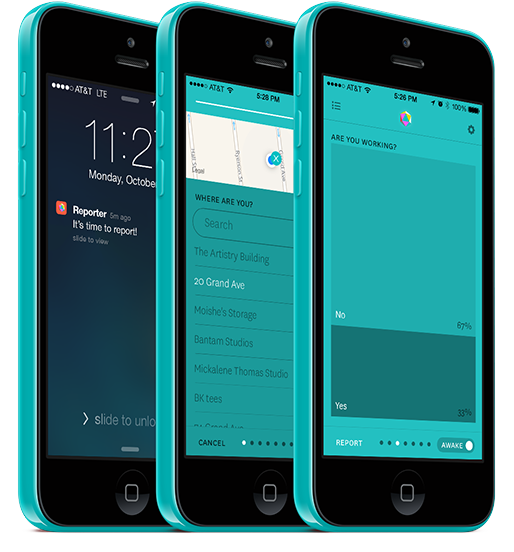The goal is to take simple measurements of mood using Likert scale over an extended period of time (e.g. two months).
I know there is a large number of mobile apps for tracking mood on every possible platform and there is an extensive list of those tools on Quantify Self website. All those tools allow you to record your mood in a simple format, customize your tracking, and choose yourself time when you want to record you mood. And this is exactly the point where all of those tools are missing a critical feature. To get a more reliable sample of a behaviour or experience, you ought to sample the experience in a random time during the waking day, rather then give the person a choice of the time of sampling (Csikszentmihalyi et al., 1987). Csikszentmihalyi et al. (1977) did just that by giving people pagers and send them random beeps, after which they filled the questionnaire. It's a basic rule in any longitudinal experience sampling studies that I remember from the first year undergraduate classes. The need of this kind of approach rises from the inability of respondents to provide an accurate retrospective information on their daily behaviour and experience.
So I am looking for mobile mood tracking tool that meets those particular requirements:
- it allows you to set up waking time within which you want to receive random reminders,
- it allows you to set up number of reminders you want to receive during the waking hours,
- during the day you receive a random reminder that directs you to a single question asking you to rate your mood at the moment, for example on 1-9 scale
- your response is time-stamped and saved either on the mobile phone or send directly to the server if possible.
Now, it sounds simple enough, but the only app I found that matches some aspects of it is Mappiness. They DO send you random reminders, and their project, idea, and app execution are awesome. But the problem with Mappiness is that it collects a lot of extra information that I don't need, and I personally got very annoyed with the length of their questionnaire (check yourself if you got an iPhone). I want a random notice, single question, 5-seconds of your time to respond, and some data export option.
Am I missing something here or such app doesn't exist and I need to write it? I realise that this question might be more relevant for http://productivity.stackexchange.com but it's hard to say, it's kind of a middle-area.
References:
Csikszentmihalyi, M., & Larson, R. (1987). Validity and reliability of the experience-sampling method. The Journal of Nervous and Mental Disease, 175(9), 526.
Csikszentmihalyi, M., Larson, R., & Prescott, S. (1977). The ecology of adolescent activity and experience. Journal of Youth and Adolescence, 6(3), 281–294.
